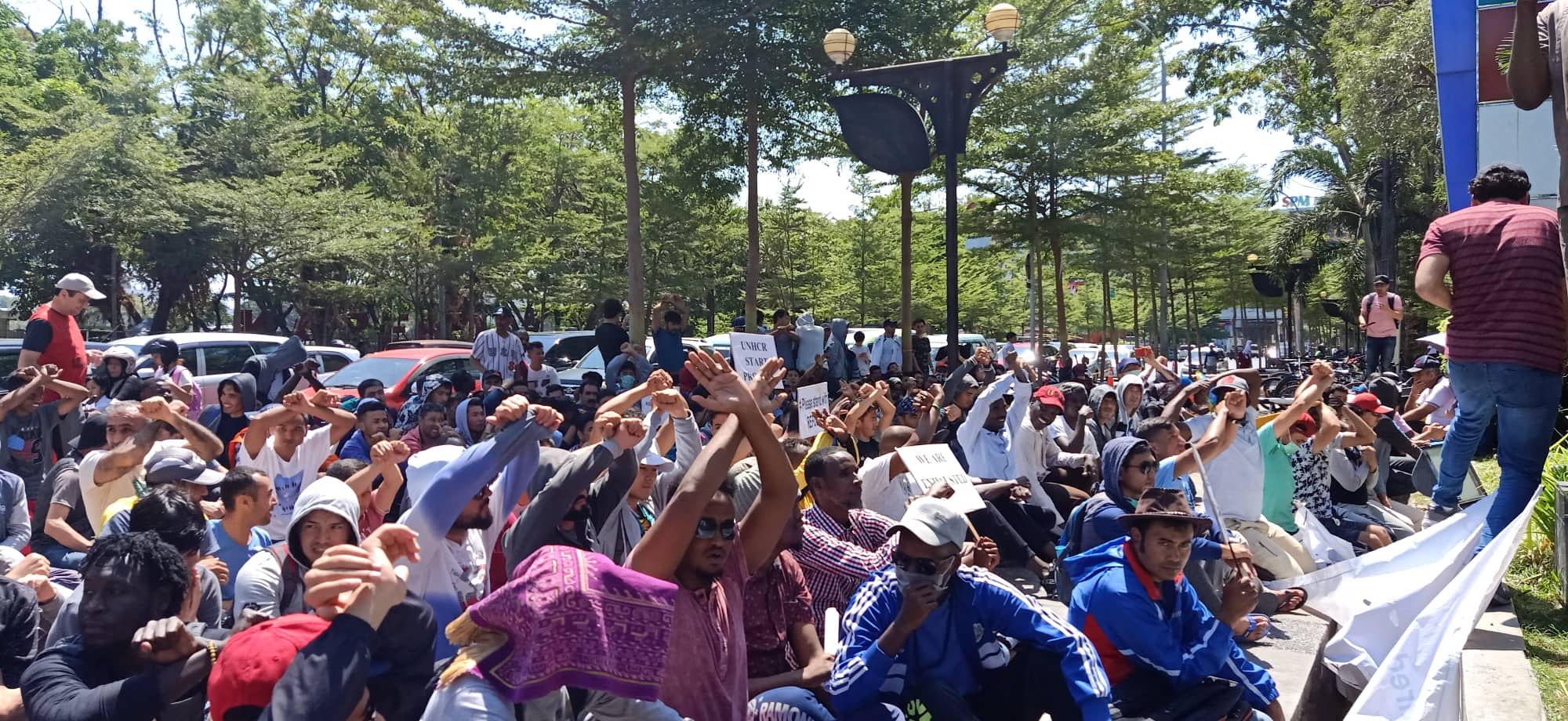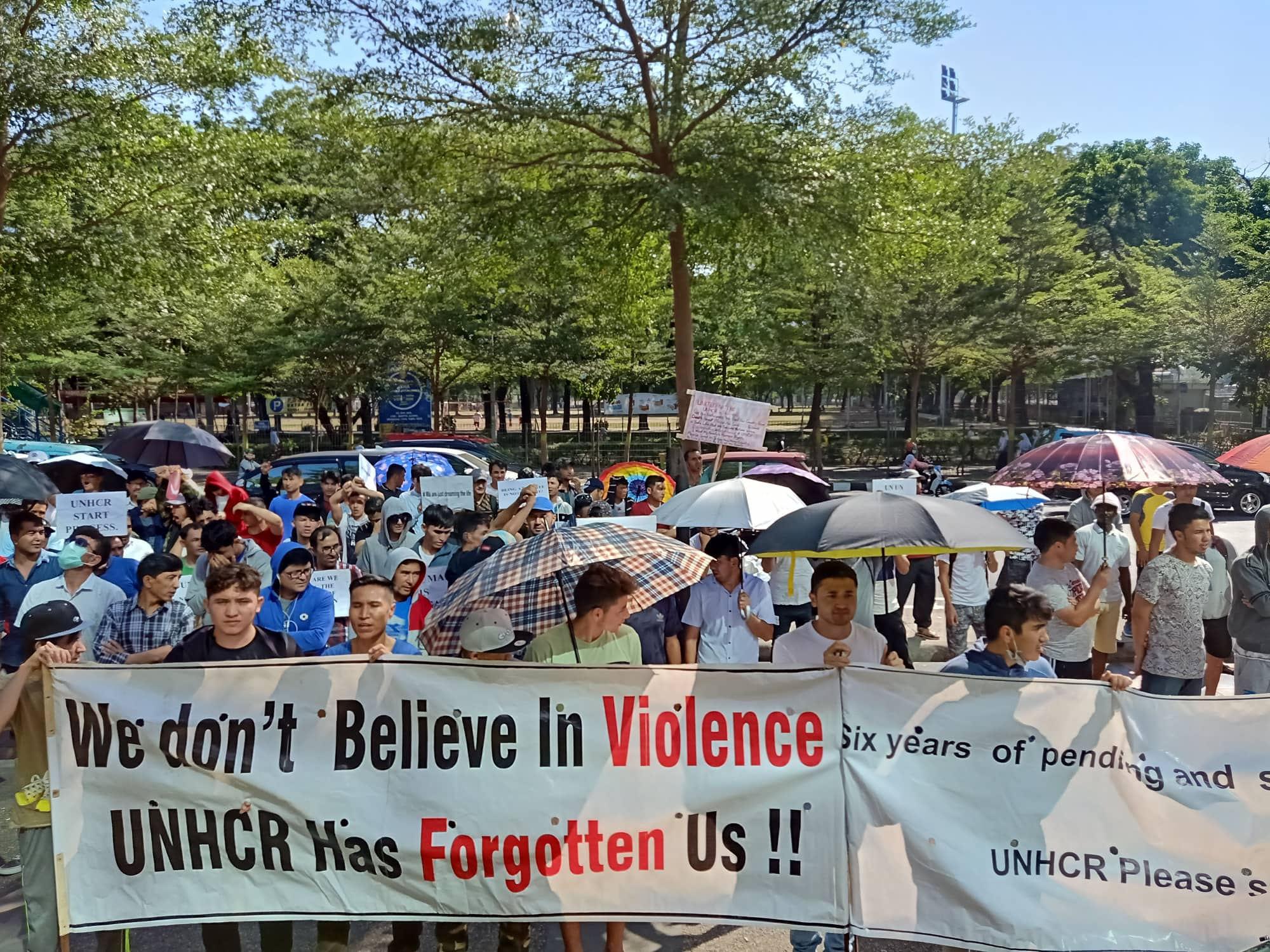In mid-May, Son Ha Dinh of the International Organization for Migration (IOM) sent out a WhatsApp message to refugees in the Indonesian city of Makassar confirming that an individual in the community had tested positive with Covid-19. Another four were then advised to self-quarantine due to suspected exposure, though their initial test results were negative.
The message sent ripples of fear throughout the community of refugees and asylum seekers in the city of two million people in the province of South Sulawesi. Due to the close proximity of refugees in Makassar, there was little to guarantee that exposure was limited to just this group of five.
Many refugees and asylum seekers in Indonesia live in cramped apartments, and even those living in IOM-sponsored accommodation face overcrowded conditions. In Makassar, 1,774 refugees are being accommodated in several buildings across the city, with all rooms shared by at least two refugees. Living in such conditions, this vulnerable group fear the toll the Covid-19 pandemic could inflict on members of their community, just as Indonesia appears to be at risk of experiencing a fresh surge of the virus.
“150 refugees are living in the same building with no space to keep distance between each other,” Asadullah Amari, an Afghan refugee and community leader in Makassar tells the Globe. “It’s a very worrying situation for us.”
As of May 31, Makassar has a confirmed 1510 Covid-19 cases with 72 deaths, while there are 25,773 cases and 1,573 deaths across the archipelago nation as a whole. In early May, there had been fewer than 12,000 cases, though many believe this doubling of reported cases in a month reflects a ramping up of testing in a country that previously boasted among the lowest testing rates per capita in the world.
Refugees and asylum seekers across Indonesia already suffer from a lack of access to adequate health care facilities. Without legal status, they are unable to visit public hospitals, utilise public healthcare services, and often cannot afford medication. IOM provides minimum healthcare to some refugees, but even this is limited to emergencies.
Refugees are concerned that if the virus spreads, Indonesian hospitals will deny them treatment and care.
“We cannot rely on Indonesian hospitals. We have faced rejection from them when we were sick many times. I have seen many of my friends die due to lack of care and support,” Asadullah says. “Last year, a young Somali refugee died as he did not receive timely medication. A close friend mine has been suffering from blood cancer for years.”

Fears of the virus in the Indonesian capital, also home to a sizable refugee population, are just as pronounced.
“Only a few receive support from the UNHCR. We are abandoned in a squalid military building crowded with children, women and elderly people. If the coronavirus reaches us, uncountable numbers of us will die,” says Hassan Ramazan, an Afghan community leader at the makeshift Kalideres refugee camp in West Jakarta, home to at least 400 refugees as of late last year.
The refugees at Kalideres have been camping out outside the military building-turned-detention centre since late January 2018, as immigration officials refuse to take them in and local government officials deny having any responsibility for them.
According to UNHCR’s latest statistics, Indonesia is home to 13,693 refugees and asylum seekers, escaping conflict from countries like Myanmar, Afghanistan, Somalia, Sudan, Iraq and Iran. Many have aspirations of being granted asylum in Australia and would have previously arrived illegally by boat, but have been stranded in transit since Australia tightened efforts to stem arrivals on its shores in 2013.
With people smuggling rings no longer able to reach Australian shores, many more refugees are registering for support in Indonesia, further stretching already limited resources. Matters were complicated further in 2014 when Australia announced it would no longer resettle refugees from Indonesia who had registered with the UNHCR in Jakarta. With both regular and irregular pathways to Australia blocked, refugees face much longer waiting times in Indonesia.

While refugees wait for a third country resettlement – a process which can take over a decade, but may never happen in some cases – they are denied rights to work, travel and formal education. Further restrictions are imposed on refugees and asylum seekers living in IOM housing, including a ban on marriage to locals, no driving and a curfew imposed from 10pm to 6am each day.
In 2018, the year Australia reduced funding to IOM in Indonesia, over 5000 refugees were living in Jakarta without shelter and with no access to healthcare. Most of the refugees now live off donations they receive from local and international NGOs.
Years of living in limbo mean many refugees have developed various kinds of health maladies, from infectious diseases to respiratory infections, malaria and intestinal worms. Another Rohingya man, Zafar Alom, living in different accommodation in Makassar is suffering from an undiagnosed infection in his genitals.
“My life has been ruined in Indonesia. I have requested help from the IOM several times, but they only gave basic medication when I needed surgery. They said it is expensive to pay for treatment at a hospital. If the coronavirus touches us, we will die easily with our preexisting health conditions.”
The four refugees suspected of direct exposure to the virus in Makassar in mid-May have been isolated from the rest of the city’s refugee community in the weeks since in a hotel rented by IOM for quarantine purposes.
But Rubual Islam, a Rohingya refugee living in the same complex as the four refugees with Covid-19, points out the impossibility of social distancing in the wider community.
The thing that worries me most is who will look after us when we all get infected, which is likely to happen soon … Previously, we would look after each other. Now, we cannot help friends
“The reason they got infected [in the first place] is we have no Covid-19 facilities. We have no hand sanitiser and masks. We try to social distance by locking ourselves up in these small rooms as much as we can, but we go out to buy groceries unprotected and we cook together in the same kitchen,” Islam says. “I want to run away from this shelter but I cannot. If I leave, I will be cut off from IOM facilities.”
There are no Covid-19 testing services available to refugees in Makassar and no one knows who is carrying the virus, which can often display few, if any, symptoms in carriers. Refugees have also not been provided with protective equipment such as masks and hand sanitiser.
“We requested masks and hand sanitiser from IOM, but they refused and said that it’s very expensive and they can’t provide us with any. Instead, they told us to look after ourselves. But how can we look after ourselves? We receive only $70 per month. That’s hardly enough to eat meals two-times each day,” Asadullah says.
The prevalence of preexisting health conditions, no means to self-isolate, combined with poor nutrition and limited access to healthcare means many refugees in Makassar, and across Indonesia, fear of how they will cope should they fall ill. The one support network they did have, their community of fellow refugees and asylum seekers, has also now been severely restricted.
“The thing that worries me most is who will look after us when we all get infected, which is likely to happen soon,” says Asadullah in Makassar. “Previously, we would look after each other. Now, we cannot help friends.”
JN Joniad is a Rohingya journalist and an editor of the Archipelago.org writers collective. His Twitter account can be found here. As a university student in Myanmar, Joniad was forced to flee into exile. Now living as a refugee in Indonesia, he contributes to film and publishing accounts of refugees searching for a safe and durable solutions.


